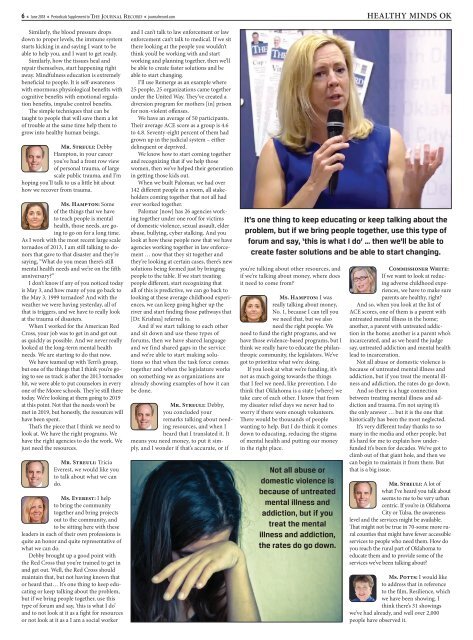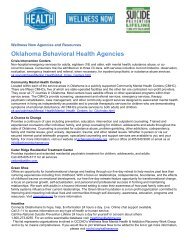Trauma-in-Oklahoma
Create successful ePaper yourself
Turn your PDF publications into a flip-book with our unique Google optimized e-Paper software.
6 « June 2018 « Periodicals Supplement to THE JOURNAL RECORD « journalrecord.com HEALTHY MINDS OK<br />
Similarly, the blood pressure drops<br />
down to proper levels, the immune system<br />
starts kick<strong>in</strong>g <strong>in</strong> and say<strong>in</strong>g I want to be<br />
able to help you, and I want to get ready.<br />
Similarly, how the tissues heal and<br />
repair themselves, start happen<strong>in</strong>g right<br />
away. M<strong>in</strong>dfulness education is extremely<br />
beneficial to people. It is self-awareness<br />
with enormous physiological benefits with<br />
cognitive benefits with emotional regulation<br />
benefits, impulse control benefits.<br />
The simple techniques that can be<br />
taught to people that will save them a lot<br />
of trouble at the same time help them to<br />
grow <strong>in</strong>to healthy human be<strong>in</strong>gs.<br />
Mr. Streuli: Debby<br />
Hampton, <strong>in</strong> your career<br />
you’ve had a front row view<br />
of personal trauma, of large<br />
scale public trauma, and I’m<br />
hop<strong>in</strong>g you’ll talk to us a little bit about<br />
how we recover from trauma.<br />
Ms. Hampton: Some<br />
of the th<strong>in</strong>gs that we have<br />
to teach people is mental<br />
health, those needs, are go<strong>in</strong>g<br />
to go on for a long time.<br />
As I work with the most recent large scale<br />
tornados of 2013, I am still talk<strong>in</strong>g to donors<br />
that gave to that disaster and they’re<br />
say<strong>in</strong>g, “What do you mean there’s still<br />
mental health needs and we’re on the fifth<br />
anniversary?”<br />
I don’t know if any of you noticed today<br />
is May 3, and how many of you go back to<br />
the May 3, 1999 tornados? And with the<br />
weather we were hav<strong>in</strong>g yesterday, all of<br />
that is triggers, and we have to really look<br />
at the trauma of disasters.<br />
When I worked for the American Red<br />
Cross, your job was to get <strong>in</strong> and get out<br />
as quickly as possible. And we never really<br />
looked at the long-term mental health<br />
needs. We are start<strong>in</strong>g to do that now.<br />
We have teamed up with Terri’s group,<br />
but one of the th<strong>in</strong>gs that I th<strong>in</strong>k you’re go<strong>in</strong>g<br />
to see us track is after the 2013 tornados<br />
hit, we were able to put counselors <strong>in</strong> every<br />
one of the Moore schools. They’re still there<br />
today. We’re look<strong>in</strong>g at them go<strong>in</strong>g to 2019<br />
at this po<strong>in</strong>t. Not that the needs won’t be<br />
met <strong>in</strong> 2019, but honestly, the resources will<br />
have been spent.<br />
That’s the piece that I th<strong>in</strong>k we need to<br />
look at. We have the right programs. We<br />
have the right agencies to do the work. We<br />
just need the resources.<br />
Mr. Streuli: Tricia<br />
Everest, we would like you<br />
to talk about what we can<br />
do.<br />
Ms. Everest: I help<br />
to br<strong>in</strong>g the community<br />
together and br<strong>in</strong>g projects<br />
out to the community, and<br />
to be sitt<strong>in</strong>g here with these<br />
leaders <strong>in</strong> each of their own professions is<br />
quite an honor and quite representative of<br />
what we can do.<br />
Debby brought up a good po<strong>in</strong>t with<br />
the Red Cross that you’re tra<strong>in</strong>ed to get <strong>in</strong><br />
and get out. Well, the Red Cross should<br />
ma<strong>in</strong>ta<strong>in</strong> that, but not hav<strong>in</strong>g known that<br />
or heard that… It’s one th<strong>in</strong>g to keep educat<strong>in</strong>g<br />
or keep talk<strong>in</strong>g about the problem,<br />
but if we br<strong>in</strong>g people together, use this<br />
type of forum and say, ‘this is what I do’<br />
and to not look at it as a fight for resources<br />
or not look at it as a I am a social worker<br />
and I can’t talk to law enforcement or law<br />
enforcement can’t talk to medical. If we sit<br />
there look<strong>in</strong>g at the people you wouldn’t<br />
th<strong>in</strong>k you’d be work<strong>in</strong>g with and start<br />
work<strong>in</strong>g and plann<strong>in</strong>g together, then we’ll<br />
be able to create faster solutions and be<br />
able to start chang<strong>in</strong>g.<br />
I’ll use Remerge as an example where<br />
25 people, 25 organizations came together<br />
under the United Way. They’ve created a<br />
diversion program for mothers [<strong>in</strong>] prison<br />
for non-violent offenses.<br />
We have an average of 50 participants.<br />
Their average ACE score as a group is 4.6<br />
to 4.8. Seventy-eight percent of them had<br />
grown up <strong>in</strong> the judicial system – either<br />
del<strong>in</strong>quent or deprived.<br />
We know how to start com<strong>in</strong>g together<br />
and recogniz<strong>in</strong>g that if we help those<br />
women, then we’ve helped their generation<br />
<strong>in</strong> gett<strong>in</strong>g those kids out.<br />
When we built Palomar, we had over<br />
142 different people <strong>in</strong> a room, all stakeholders<br />
com<strong>in</strong>g together that not all had<br />
ever worked together.<br />
Palomar [now] has 26 agencies work<strong>in</strong>g<br />
together under one roof for victims<br />
of domestic violence, sexual assault, elder<br />
abuse, bully<strong>in</strong>g, cyber stalk<strong>in</strong>g. And you<br />
look at how these people now that we have<br />
agencies work<strong>in</strong>g together <strong>in</strong> law enforcement<br />
… now that they sit together and<br />
they’re look<strong>in</strong>g at certa<strong>in</strong> cases, there’s new<br />
solutions be<strong>in</strong>g formed just by br<strong>in</strong>g<strong>in</strong>g<br />
people to the table. If we start treat<strong>in</strong>g<br />
people different, start recogniz<strong>in</strong>g that<br />
all of this is predictive, we can go back to<br />
look<strong>in</strong>g at these average childhood experiences,<br />
we can keep go<strong>in</strong>g higher up the<br />
river and start f<strong>in</strong>d<strong>in</strong>g those pathways that<br />
[Dr. Krishna] referred to.<br />
And if we start talk<strong>in</strong>g to each other<br />
and sit down and use these types of<br />
forums, then we have shared language<br />
and we f<strong>in</strong>d shared gaps <strong>in</strong> the service<br />
and we’re able to start mak<strong>in</strong>g solutions<br />
so that when the task force comes<br />
together and when the legislature works<br />
on someth<strong>in</strong>g we as organizations are<br />
already show<strong>in</strong>g examples of how it can<br />
be done.<br />
Mr. Streuli: Debby,<br />
you concluded your<br />
remarks talk<strong>in</strong>g about need<strong>in</strong>g<br />
resources, and when I<br />
heard that I translated it. It<br />
means you need money, to put it simply,<br />
and I wonder if that’s accurate, or if<br />
It’s one th<strong>in</strong>g to keep educat<strong>in</strong>g or keep talk<strong>in</strong>g about the<br />
problem, but if we br<strong>in</strong>g people together, use this type of<br />
forum and say, ‘this is what I do’ … then we’ll be able to<br />
create faster solutions and be able to start chang<strong>in</strong>g.<br />
you’re talk<strong>in</strong>g about other resources, and<br />
if we’re talk<strong>in</strong>g about money, where does<br />
it need to come from?<br />
Ms. Hampton: I was<br />
really talk<strong>in</strong>g about money,<br />
No. 1, because I can tell you<br />
we need that, but we also<br />
need the right people. We<br />
need to fund the right programs, and we<br />
have those evidence-based programs, but I<br />
th<strong>in</strong>k we really have to educate the philanthropic<br />
community, the legislators. We’ve<br />
got to prioritize what we’re do<strong>in</strong>g.<br />
If you look at what we’re fund<strong>in</strong>g, it’s<br />
not as much go<strong>in</strong>g towards the th<strong>in</strong>gs<br />
that I feel we need, like prevention. I do<br />
th<strong>in</strong>k that <strong>Oklahoma</strong> is a state [where] we<br />
take care of each other. I know that from<br />
my disaster relief days we never had to<br />
worry if there were enough volunteers.<br />
There would be thousands of people<br />
want<strong>in</strong>g to help. But I do th<strong>in</strong>k it comes<br />
down to educat<strong>in</strong>g, reduc<strong>in</strong>g the stigma<br />
of mental health and putt<strong>in</strong>g our money<br />
<strong>in</strong> the right place.<br />
Not all abuse or<br />
domestic violence is<br />
because of untreated<br />
mental illness and<br />
addiction, but if you<br />
treat the mental<br />
illness and addiction,<br />
the rates do go down.<br />
Commissioner White:<br />
If we want to look at reduc<strong>in</strong>g<br />
adverse childhood experiences,<br />
we have to make sure<br />
parents are healthy, right?<br />
And so, when you look at the list of<br />
ACE scores, one of them is a parent with<br />
untreated mental illness <strong>in</strong> the home;<br />
another, a parent with untreated addiction<br />
<strong>in</strong> the home; another is a parent who’s<br />
<strong>in</strong>carcerated, and as we heard the judge<br />
say, untreated addiction and mental health<br />
lead to <strong>in</strong>carceration.<br />
Not all abuse or domestic violence is<br />
because of untreated mental illness and<br />
addiction, but if you treat the mental illness<br />
and addiction, the rates do go down.<br />
And so there is a huge connection<br />
between treat<strong>in</strong>g mental illness and addiction<br />
and trauma. I’m not say<strong>in</strong>g it’s<br />
the only answer … but it is the one that<br />
historically has been the most neglected.<br />
It’s very different today thanks to so<br />
many <strong>in</strong> the media and other people, but<br />
it’s hard for me to expla<strong>in</strong> how underfunded<br />
it’s been for decades. We’ve got to<br />
climb out of that giant hole, and then we<br />
can beg<strong>in</strong> to ma<strong>in</strong>ta<strong>in</strong> it from there. But<br />
that is a big issue.<br />
Mr. Streuli: A lot of<br />
what I’ve heard you talk about<br />
seems to me to be very urban<br />
centric. If you’re <strong>in</strong> <strong>Oklahoma</strong><br />
City or Tulsa, the awareness<br />
level and the services might be available.<br />
That might not be true <strong>in</strong> 70-some more rural<br />
counties that might have fewer accessible<br />
services to people who need them. How do<br />
you reach the rural part of <strong>Oklahoma</strong> to<br />
educate them and to provide some of the<br />
services we’ve been talk<strong>in</strong>g about?<br />
Ms. Potts: I would like<br />
to address that <strong>in</strong> reference<br />
to the film, Resilience, which<br />
we have been show<strong>in</strong>g. I<br />
th<strong>in</strong>k there’s 31 show<strong>in</strong>gs<br />
we’ve had already, and well over 2,000<br />
people have observed it.



